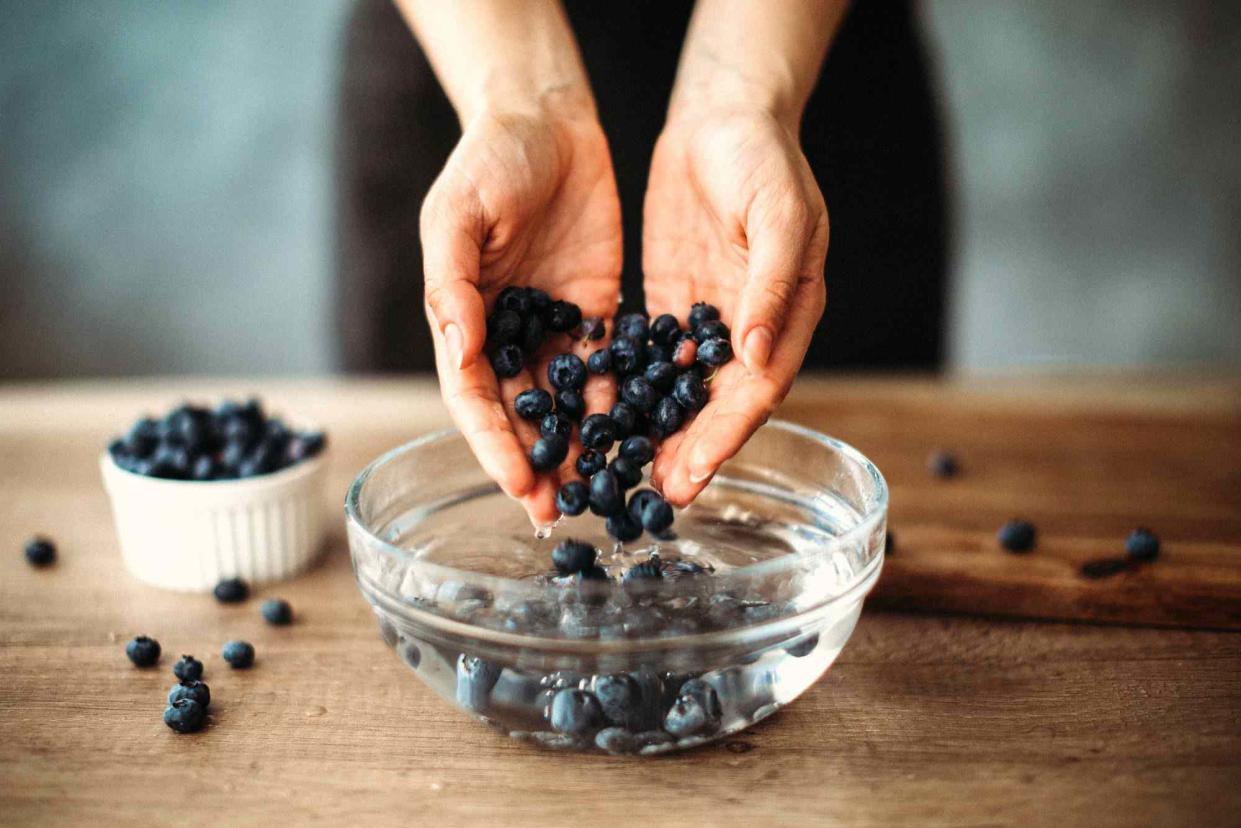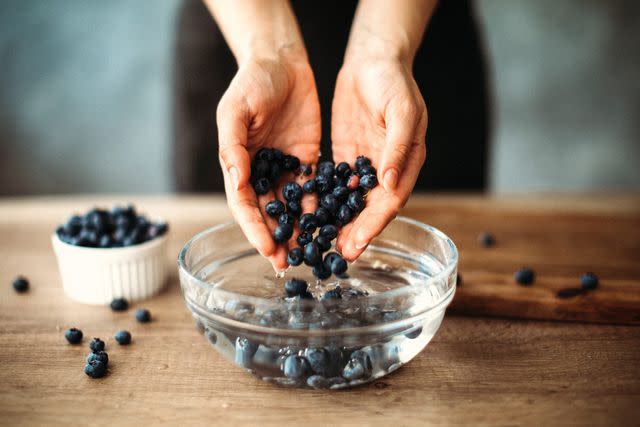5 Fruit Storage Mistakes You're Probably Making, According to an Expert
And what to do instead.

Reviewed by Dietitian Emily Lachtrupp, M.S., RD
Few things compare to biting into fresh fruit at the peak of ripeness, especially when it's locally sourced and in season. However, the fact you purchased a pint of wild blueberries directly from a forager in Maine or picked apples at an orchard in the fall won't mean anything if you don't know how to store fruit correctly.
And how to store fruit correctly isn't as straightforward as you might think. There are a variety of issues at play—and those can vary from one kitchen to another. Here we outline five common fruit storage mistakes and what you should do instead.

1. You Wash Berries Before Refrigerating Them
It can be tempting to give berries a rinse before storing them in the refrigerator. After all, it can give you some peace of mind knowing that whoever grabs a berry doesn't have to worry about it being clean. Plus it can save time later, no?
"Never, never, never, never do that," says Robert Schueller, produce expert at Melissa's Produce. "All fruits have a natural barrier that allows them to ripen slowly on the plant. If you rinse them, you take off that protective layer, causing them to break down very quickly. This is particularly true for berries, which can start breaking down within hours."
To ensure those fragile, perishable berries stay fresh for longer, don't wash them before putting them in the fridge—wait to give them a rinse right before you intend to eat them.
2. You Keep a Bowl of Bananas with Other Ripe Fruit on Your Counter
We get it. Showcasing a bowl of fruit on your kitchen counter is pretty— and it could help you eat more fruit, which comes with a whole load of health benefits, including a lower risk of heart disease and stroke and improved brain health. But what you keep in that fruit bowl matters.
Many of us will put a bunch of bananas in a fruit bowl and surround it with other types of fruit. But that practice can backfire. Bananas release a gas called ethylene that acts as a hormone, inducing ripening in other fruit. In fact, if you have unripe fruit you want to ripen quickly—like avocados—you can place the fruit in a bag along with a banana to hasten the ripening process.
But if your fruit is already ripe, putting it in a bowl with bananas can cause it to over-ripen, turning that perfectly ripe peach from juicy to mushy before you're able to enjoy it. Save the fruit bowl for bananas and fruits that aren't quite ripe yet, and make sure to check it frequently, moving fruit to the refrigerator as it ripens to keep it at peak quality.
Related: 25+ Healthy Recipes to Make with a Bunch of Ripe Bananas
3. You Don't Consider How Hot Your Kitchen Is
Schueller says, "You can't assume your kitchen is the coolest part of your house. And when your kitchen is warm, it increases ethylene production." The temperature of your kitchen may feel obvious while you have a roast in the oven. But consider this: the typical U.S. home kitchen has a stove, oven, refrigerator, dishwasher and microwave—all of which generate heat when they're in use (and that's always for your refrigerator!). Plus the lights in your kitchen add additional warmth. All of this together can make for a perfect environment to over-ripen fresh produce before you can sink your teeth into it. So once your produce is ripe, consider moving it into the fridge to stop the ripening process, or use your bowl of ripe fruit as decor in a cooler part of your house, like on a table in your foyer or living room.
4. You Refrigerate Your Citrus
One thing that few professional cooks will argue against is refrigerating citrus that you intend to juice later. An ice-cold clementine can be a refreshing treat. However, if you store lemons or limes in the refrigerator, you may find you have to use twice as much as expected when you're trying to whip up a pitcher of lemonade or throw together a ceviche. This is because refrigerating citrus—no matter how juicy—makes the fruits harder, which makes them more difficult to squeeze and extract all of their juice.
Now, if you live in a hot climate, you may find that citrus molds more quickly at room temperature, or it may dry out much too quickly in arid environments. In such cases, the refrigerator may be the best option. If that's your situation, you can make your lemons and limes softer and easier to squeeze by microwaving them for just a few seconds. You can also roll them on a cutting board, which will loosen up the fruit's cell walls while also releasing some of the flavorful essential oils stored in the skin.
And Schueller shared this juicing tip with us: "Most people cut citrus crosswise, but if you cut them lengthwise, you'll get more juice out of the fruit—about 10% more," especially if you're squeezing the citrus by hand versus using a manual juicer.
Related: 10+ Easy Citrus Vinaigrettes That Will Make You Love Salad Again
5. You Dump Fresh Fruit into a Bag Before Freezing
Sometimes you just have to freeze fruit. Either you didn't manage to eat that entire pineapple you bought before leaving for a trip, or your mango tree is producing faster than you can eat them and you'd like to save that summer flavor for later in the year. While we applaud your sensibility for reducing food waste, if you just chop it up, dump it in a container and pop it in the freezer, you may be disappointed to discover that the fruit froze into a solid block the size of a floor tile. This can be OK if you're planning to use all of it at once, but if you just need a handful of strawberries for a smoothie, you may not want to be hacking away at that slab.
Luckily, the solution is actually quite simple! Place the fruit on a sheet pan lined with parchment or wax paper, leaving a little space between each piece. Then when the fruit is frozen solid, transfer it to a storage container. By freezing fruit in this manner, you can avoid the frozen block of fruit pulp and be able to grab a handful of fruit at a time.
Related: The Best Food Dehydrators, According to Our Test Kitchen
Bottom Line
Fruit is not only delicious but it's also a collective powerhouse of nutrients. However, if you don't store it properly, you may end up wasting more than you eat. By avoiding some of the common produce storage mistakes above, you can ensure that you and your family have access to fresh, healthy fruit while also saving money.







